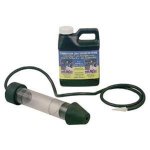Hi -
I purchaced my first boat last spring (1995 Carver 325 Aft Cabin) and it's been a joy and a terrific learning experiance, with the exception of my dealings with the marina service department. That has mostly been a pain in my rear end. They charge a fourtune and rarely fix the problem.
I don't know much about engine repair (Crusader 350XL fuel injected), but I am good with tools when pointed in the correct direction and really enjoy the work. For instance, a friend told me that the problem on my boat last summer was the fuel pump, so I bought a new one and swapped it out, problem solved. Near the end of the season I noticed white smoke comming from the port engine, and i've also noticed a reduction in coolent after a trip. Typically if I cross the Great South Bay and back I'll lose 1/2 a solo cup's worth. Internet searches suggest it's a head gasket....SO, my question to everyone is, can it be anything else? What should I look for to confirm? And lastly, if it is the head gasket, is this a job I could do with a book in hand or is it foolish to attempt?
I purchaced my first boat last spring (1995 Carver 325 Aft Cabin) and it's been a joy and a terrific learning experiance, with the exception of my dealings with the marina service department. That has mostly been a pain in my rear end. They charge a fourtune and rarely fix the problem.
I don't know much about engine repair (Crusader 350XL fuel injected), but I am good with tools when pointed in the correct direction and really enjoy the work. For instance, a friend told me that the problem on my boat last summer was the fuel pump, so I bought a new one and swapped it out, problem solved. Near the end of the season I noticed white smoke comming from the port engine, and i've also noticed a reduction in coolent after a trip. Typically if I cross the Great South Bay and back I'll lose 1/2 a solo cup's worth. Internet searches suggest it's a head gasket....SO, my question to everyone is, can it be anything else? What should I look for to confirm? And lastly, if it is the head gasket, is this a job I could do with a book in hand or is it foolish to attempt?




















